外研版七年级英语上册 Module 8 Choosing presents. 复习课件(共17张PPT)
文档属性
| 名称 | 外研版七年级英语上册 Module 8 Choosing presents. 复习课件(共17张PPT) | 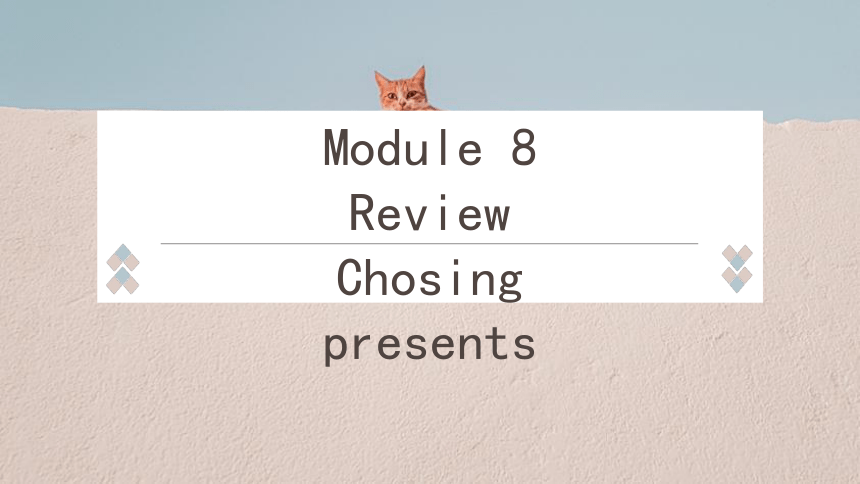 | |
| 格式 | zip | ||
| 文件大小 | 3.7MB | ||
| 资源类型 | 教案 | ||
| 版本资源 | 外研版 | ||
| 科目 | 英语 | ||
| 更新时间 | 2022-07-20 13:04:45 | ||
图片预览

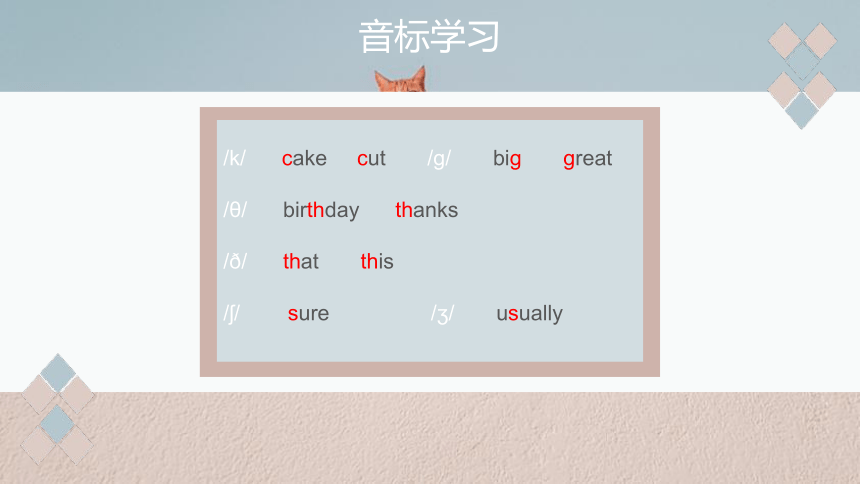
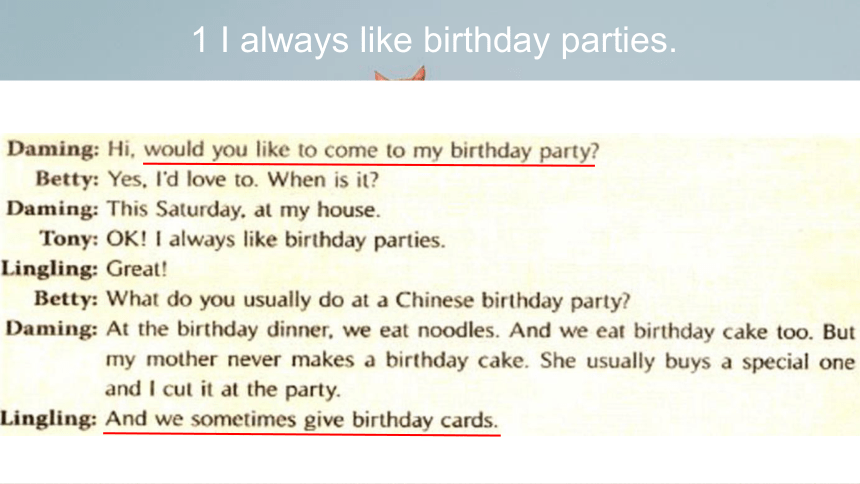
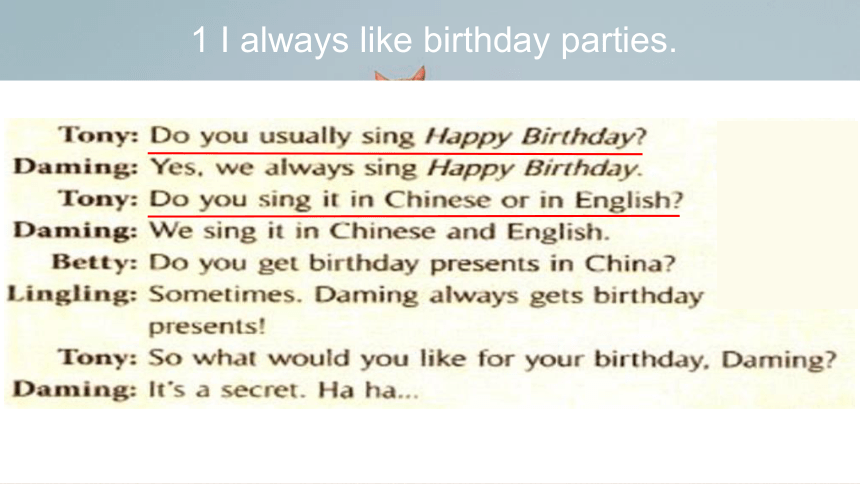
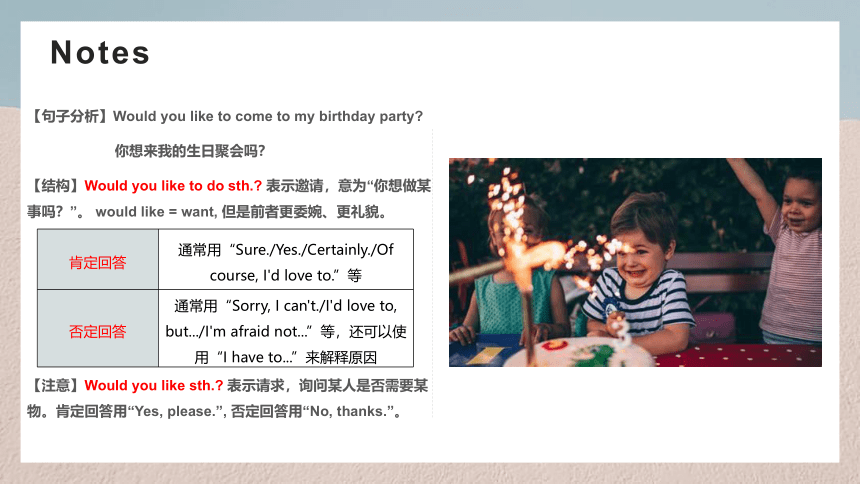
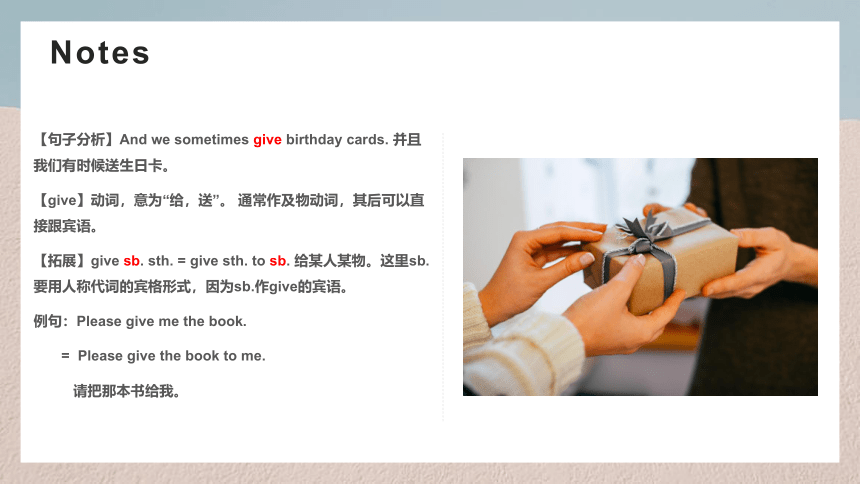

文档简介
(共17张PPT)
Module 8 Review
Chosing presents
/k/ cake cut /g/ big great
/θ/ birthday thanks
/ / that this
/ / sure / / usually
音标学习
1 I always like birthday parties.
1 I always like birthday parties.
【句子分析】Would you like to come to my birthday party
你想来我的生日聚会吗?
【结构】Would you like to do sth. 表示邀请,意为“你想做某事吗?”。 would like = want, 但是前者更委婉、更礼貌。
【注意】Would you like sth. 表示请求,询问某人是否需要某物。肯定回答用“Yes, please.”, 否定回答用“No, thanks.”。
Notes
肯定回答 通常用“Sure./Yes./Certainly./Of course, I'd love to.”等
否定回答 通常用“Sorry, I can't./I'd love to, but.../I'm afraid not...”等,还可以使用“I have to...”来解释原因
【句子分析】And we sometimes give birthday cards. 并且我们有时候送生日卡。
【give】动词,意为“给,送”。 通常作及物动词,其后可以直接跟宾语。
【拓展】give sb. sth. = give sth. to sb. 给某人某物。这里sb.要用人称代词的宾格形式,因为sb.作give的宾语。
例句:Please give me the book.
= Please give the book to me.
请把那本书给我。
Notes
【句子分析】Do you usually sing Happy Birthday 你们通常唱《生日快乐》歌吗?
【happy】形容词,意为“快乐的”
【注意】Happy birthday to you的回答是thank you.
Notes
【句子分析】Do you sing it in Chinese or in English
你们同中文唱还是用英文唱?
【or】并列连词,连接选择疑问句,结构是“一般疑问句 + or + 另一个选择成分”。回答不能用yes或no, 应该根据选择成分来回答。
例句:- Do you like swimming or running
你喜欢游泳还是跑步?
- I like running.
我喜欢跑步。
Notes
2 She often goes to concerts.
Notes
【句子分析】Choosing birthday presents 选择生日礼物
【choose】动词,意为“选择;挑选
【同根词】choice n. 选择
【短语】choose to do sth. 选择做某事
【句子分析】Daming's grandparents like to stay healthy, so every day they get some exercise in a park near their home. 大明的爷爷奶奶喜欢保持健康,所以他们每天都在家附近的公园里锻炼。
【exercise】
1. 作不可数名词时,意为“锻炼;运动”- take/do exercise 锻炼身体
2. 作可数名词时,意为“练习;体操” - do English exercises 做英语练习/do morning exercises 做早操
3. exercise 作动词
不及物动词“锻炼(身体);运动” How often do you exercise
你多长时间锻炼一次?
及物动词“锻炼(身体部位)” He exercises his legs every day.
他每天都进行腿部锻炼。
【句子分析】She likes going shopping and always buys expensive clothes. 她喜欢购物,总是买昂贵的衣服。
【expensive】形容词,意为“昂贵的”。
例句:He doesn't want to buy anything expensive. 他不想买任何昂贵的东西。
【拓展】
反义词:cheap adj. 便宜的
同义词:sear adj. 昂贵的
Notes
【句子分析】She spends a lot of money. 她花很多钱。
【spend】动词,意为“花费”,主语通常是表示人的名词或代词。
【拓展】spend 固定搭配
1. spend ... on sth.
例句:I spend some money on books and magazines.
我花一些钱买书和杂志。
2. spend ... (in) doing sth.
例句:He has to spend much money repairing the car.
他不得不花很多钱修车。
Notes
【辨析】spend/paycost/take 都有“花费”的意思,但是用法不同。
Notes
cost 常用于表示“花钱”,主语多是事或物 sth. cost(s) sb. + money
pay 常用于表示“花钱”,主语是人,和介词for搭配 sb. pay(s) some money for sth.
spend 可以表示“花时间”,也可以表示“花钱”,主语是人 sb. spend(s) some money/time on sth./(in) doing sth.
take 常用于表示“花时间” It takes sb. some time to do sth.
频率副词 含义 百分比 例句
always 一直;总是 100% The sun always rises in the east and sets in the west.
usually 通常 80% I usually ask my father for help.
often 经常 30-50% It often rains here in April.
sometimes 有时 20% Sometimes she writes to me.
seldom/hardly 几乎不 5% I don't like swimming, so I hardly/seldom go swimming.
never 从不 0% I never tell lies.
频 率 副 词
【辨析】wear, put on, be in, dress
wear 意为“穿;戴”,强调穿着状态,其后可以跟衣服、鞋帽,还可以跟首饰等物品 He is wearing a black shirt.
他穿着一件黑色衬衣。
put on 意为“穿上;戴上”,强调穿的动作,其后可以跟衣服、鞋帽等 Put on your coat.
穿上你的外套。
be in 也表示“穿着;戴着”的状态,其后可跟衣服或颜色类的词汇 She is in a red dress today.
她今天穿着一件红色连衣裙。
dress 意为“穿衣服”,其后只能跟表示人的名词或代词作宾语,注意不能跟衣服、鞋帽等 Can the boy dress himself
那个男孩会自己穿衣服吗?
易错易混全解
【辨析】listen, hear, sound
listen 表示“听”,强调“听”的动作,是不及物物动词,若跟宾语要用listen to Please listen to me carefully.
请认真听我说。
hear 表示“听见”,强调“听”的结果 Can you hear me
你能听见我说话吗?
sound 表示“听起来”,是感官动词,后跟形容词作表语 Your idea sounds great.
你的想法听起来太棒了。
易错易混全解
3 Language in use
1. - Would you like to come to our school for the open day tomorror
- ___________. But I have to go to Beijing for a meeting.
A. That's it B. Let me see C. OK D. I'd like to
2. - It's too hot today. Please give __________ a bottle of orange juice.
A. my B. he C. her D. his
3. - Lucy, do you want to join the art club or the chess club
- __________. I like drawing pictures.
A. Yes, I do B. The art club C. No, I don't D. The chess club
4. It's very nice of you to __________ so much time _________ me around your school.
A. cost; to show B. pay; for C. spend; to show D. spend; showing
5. Many students in my class are ___________ (戴) glasses.
D
C
B
D
wearing
Module 8 Review
Chosing presents
/k/ cake cut /g/ big great
/θ/ birthday thanks
/ / that this
/ / sure / / usually
音标学习
1 I always like birthday parties.
1 I always like birthday parties.
【句子分析】Would you like to come to my birthday party
你想来我的生日聚会吗?
【结构】Would you like to do sth. 表示邀请,意为“你想做某事吗?”。 would like = want, 但是前者更委婉、更礼貌。
【注意】Would you like sth. 表示请求,询问某人是否需要某物。肯定回答用“Yes, please.”, 否定回答用“No, thanks.”。
Notes
肯定回答 通常用“Sure./Yes./Certainly./Of course, I'd love to.”等
否定回答 通常用“Sorry, I can't./I'd love to, but.../I'm afraid not...”等,还可以使用“I have to...”来解释原因
【句子分析】And we sometimes give birthday cards. 并且我们有时候送生日卡。
【give】动词,意为“给,送”。 通常作及物动词,其后可以直接跟宾语。
【拓展】give sb. sth. = give sth. to sb. 给某人某物。这里sb.要用人称代词的宾格形式,因为sb.作give的宾语。
例句:Please give me the book.
= Please give the book to me.
请把那本书给我。
Notes
【句子分析】Do you usually sing Happy Birthday 你们通常唱《生日快乐》歌吗?
【happy】形容词,意为“快乐的”
【注意】Happy birthday to you的回答是thank you.
Notes
【句子分析】Do you sing it in Chinese or in English
你们同中文唱还是用英文唱?
【or】并列连词,连接选择疑问句,结构是“一般疑问句 + or + 另一个选择成分”。回答不能用yes或no, 应该根据选择成分来回答。
例句:- Do you like swimming or running
你喜欢游泳还是跑步?
- I like running.
我喜欢跑步。
Notes
2 She often goes to concerts.
Notes
【句子分析】Choosing birthday presents 选择生日礼物
【choose】动词,意为“选择;挑选
【同根词】choice n. 选择
【短语】choose to do sth. 选择做某事
【句子分析】Daming's grandparents like to stay healthy, so every day they get some exercise in a park near their home. 大明的爷爷奶奶喜欢保持健康,所以他们每天都在家附近的公园里锻炼。
【exercise】
1. 作不可数名词时,意为“锻炼;运动”- take/do exercise 锻炼身体
2. 作可数名词时,意为“练习;体操” - do English exercises 做英语练习/do morning exercises 做早操
3. exercise 作动词
不及物动词“锻炼(身体);运动” How often do you exercise
你多长时间锻炼一次?
及物动词“锻炼(身体部位)” He exercises his legs every day.
他每天都进行腿部锻炼。
【句子分析】She likes going shopping and always buys expensive clothes. 她喜欢购物,总是买昂贵的衣服。
【expensive】形容词,意为“昂贵的”。
例句:He doesn't want to buy anything expensive. 他不想买任何昂贵的东西。
【拓展】
反义词:cheap adj. 便宜的
同义词:sear adj. 昂贵的
Notes
【句子分析】She spends a lot of money. 她花很多钱。
【spend】动词,意为“花费”,主语通常是表示人的名词或代词。
【拓展】spend 固定搭配
1. spend ... on sth.
例句:I spend some money on books and magazines.
我花一些钱买书和杂志。
2. spend ... (in) doing sth.
例句:He has to spend much money repairing the car.
他不得不花很多钱修车。
Notes
【辨析】spend/paycost/take 都有“花费”的意思,但是用法不同。
Notes
cost 常用于表示“花钱”,主语多是事或物 sth. cost(s) sb. + money
pay 常用于表示“花钱”,主语是人,和介词for搭配 sb. pay(s) some money for sth.
spend 可以表示“花时间”,也可以表示“花钱”,主语是人 sb. spend(s) some money/time on sth./(in) doing sth.
take 常用于表示“花时间” It takes sb. some time to do sth.
频率副词 含义 百分比 例句
always 一直;总是 100% The sun always rises in the east and sets in the west.
usually 通常 80% I usually ask my father for help.
often 经常 30-50% It often rains here in April.
sometimes 有时 20% Sometimes she writes to me.
seldom/hardly 几乎不 5% I don't like swimming, so I hardly/seldom go swimming.
never 从不 0% I never tell lies.
频 率 副 词
【辨析】wear, put on, be in, dress
wear 意为“穿;戴”,强调穿着状态,其后可以跟衣服、鞋帽,还可以跟首饰等物品 He is wearing a black shirt.
他穿着一件黑色衬衣。
put on 意为“穿上;戴上”,强调穿的动作,其后可以跟衣服、鞋帽等 Put on your coat.
穿上你的外套。
be in 也表示“穿着;戴着”的状态,其后可跟衣服或颜色类的词汇 She is in a red dress today.
她今天穿着一件红色连衣裙。
dress 意为“穿衣服”,其后只能跟表示人的名词或代词作宾语,注意不能跟衣服、鞋帽等 Can the boy dress himself
那个男孩会自己穿衣服吗?
易错易混全解
【辨析】listen, hear, sound
listen 表示“听”,强调“听”的动作,是不及物物动词,若跟宾语要用listen to Please listen to me carefully.
请认真听我说。
hear 表示“听见”,强调“听”的结果 Can you hear me
你能听见我说话吗?
sound 表示“听起来”,是感官动词,后跟形容词作表语 Your idea sounds great.
你的想法听起来太棒了。
易错易混全解
3 Language in use
1. - Would you like to come to our school for the open day tomorror
- ___________. But I have to go to Beijing for a meeting.
A. That's it B. Let me see C. OK D. I'd like to
2. - It's too hot today. Please give __________ a bottle of orange juice.
A. my B. he C. her D. his
3. - Lucy, do you want to join the art club or the chess club
- __________. I like drawing pictures.
A. Yes, I do B. The art club C. No, I don't D. The chess club
4. It's very nice of you to __________ so much time _________ me around your school.
A. cost; to show B. pay; for C. spend; to show D. spend; showing
5. Many students in my class are ___________ (戴) glasses.
D
C
B
D
wearing
同课章节目录
- Starte
- Module 1 My teacher and my friends
- Module 2 My English lesson
- Module 3 My English book
- Module 4 My everyday life
- Module 1 My classmates
- Unit 1 Nice to meet you.
- Unit 2 I'm Wang Lingling and I'm thirteen years ol
- Unit 3 Language in use.
- Module 2 My family
- Unit 1 Is this your mum?
- Unit 2 These are my parents.
- Unit 3 Language in use.
- Module 3 My school
- Unit 1 There are thirty students in my class.
- Unit 2 The library is on the left of the playgroun
- Unit 3 Language in use.
- Module 4 Healthy food
- Unit 1 We've got lots of apples.
- Unit 2 Is your food and drink healthy?
- Unit 3 Language in use.
- Module 5 My school day
- Unit 1 I love history.
- Unit 2 We start work at nine o'clock.
- Unit 3 Language in use.
- Revision module A
- Module 6 A trip to the zoo
- Unit 1 Does it eat meat?
- Unit 2 The tiger lives in Asia.
- Unit 3 Language in use.
- Module 7 Computers
- Unit 1 How do I write my homework on the computer?
- Unit 2 When do you use a computer?
- Unit 3 Language in use.
- Module 8 Choosing presents
- Unit 1 I always like birthday parties.
- Unit 2 She often goes to concerts.
- Unit 3 Language in use.
- Module 9 People and places
- Unit 1 We're enjoying the school trip a lot.
- Unit 2 They're waiting for buses or trains.
- Unit 3 Language in use.
- Module 10 Spring Festival
- Unit 1 Are you getting ready for Spring Festival?
- Unit 2 My mother's cleaning our houses and sweepin
- Unit 3 Language in use.
- Revision module B
